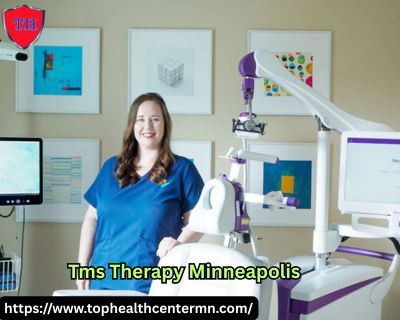Anxiety and depression are two of the most prevalent mental health problems in the world today, affecting countless individuals across the globe. While conventional treatments, such as medications and/or talk therapy, provide relief to many, some patients do not respond sufficiently, resulting in no lasting relief. This is where TMS Therapy in Minneapolis has been developed as a novel option for clinical relief.
What is TMS Therapy?
Transcranial Magnetic Stimulation, or TMS, is a non-invasive treatment option that uses magnetic pulses to stimulate nerve cells in the brain. This targeted stimulation has been shown to improve mood and relieve depressive and/or anxious symptoms.
TMS Therapy in Minneapolis, unlike other traditional modalities, offers a unique non-drug option that patients can pursue when medications or psychotherapy have been ineffective. TMS is an outpatient procedure, and consequently, patients receiving therapy in this manner can keep their regular daily routine.
How Does TMS Therapy Work?
TMS Therapy in Minneapolis is the technique where the patient receives a magnetic coil on the scalp. The coil administers magnetic pulses that stimulate brain areas that regulate mood.
A typical TMS Therapy session lasts 30 to 40 minutes and a person will typically receive multiple sessions, usually over a couple of weeks. While this may sound complicated, it is a painless, safe procedure, and requires no anesthesia.
What is the Science Behind TMS?
TMS Therapy in Minneapolis works by stimulating neurons in the prefrontal cortex. The prefrontal cortex is an area of the brain that tends to be underactive in people with depression. Stimulation is provided over a period of time, which enhances neuroplasticity the brain’s ability to form new connections thereby restoring emotional balance and relieving mood symptoms.
Clinical studies suggest TMS can be effective, especially if found in those patients who have treatment-resistant depression. Improvement has been noted as well, when individuals report improvement in anxiety, concentration, and overall thinking clarity.
Benefits of TMS Therapy in Minneapolis
When patients in Minneapolis are looking at TMS Therapy, they often wonder about the advantages when compared to other methods of treatment. Here are the main advantages:
1. It is a Non-Invasive treatment. There is no surgical procedure or anesthesia needed.
2. There are Minimal Side Effects. Occasionally, you will have a little discomfort at the treatment site or a headache, however, this is usually, minimal to mild, and temporary.
3. It is Targeted, using magnetic pulses to stimulate the area of the brain that will have the most impact focusing on the area where the more symptom distress impact, for the greatest effect.
4. For cases that are Resistant, TMS has shown enhancement in treatment prescription-resistant major depressive disorder (MDD), anxiety, and generalized anxiety disorder (GAD).
5. No Systemic side effects: Unlike medications, TMS does not cause fatigue, nausea, weight gain, etc.
Who is a Good Candidate for TMS Therapy?
TMS Therapy in Minneapolis is an option for individuals diagnosed with major depressive disorder (MDD) or who have a diagnosis of general anxiety disorder (GAD) and have not improved sufficiently using traditional treatment methods.
All patients are evaluated by a mental health professional to appropriately select candidates for TMS therapy. As an example, previous medical history, current medications, and symptom severity will all be evaluated to make the best patient choice for safety and outcome reasons.
What Happens During a TMS Session?
Understanding the experience is important for first-time patients. A typical TMS session consists of:
1. Consultation: Clinicians review the patient’s medical history and mental health history.
2. Brain Mapping: The clinician uses the magnetic coil to directly stimulate specific areas of the patient’s brain.
3. Stimulation: The clinician delivers the magnetic pulses through the coil in 2–3-minute bursts complete mini-amp SV readers permanently programed power output of 30-40 minutes.
4. Monitoring: During the procedure, the patient will be awake and alert.
5. Follow Up: A typical course of treatment will involve 20–30 total sessions over several weeks.
Most patients will notice improvements within three or four sessions, but most optimal effects happen at the conclusion of treatment.
Real-World Impact
Consider Emily, who lives in Minneapolis and had suffered major depression for many years. Conventional medications had provided minimal relief. After being treated with TMS Therapy in Minneapolis, Emily reported that within weeks her mood lifted, anxiety decreased, and she was functioning better in daily life.
Emily’s experience exemplifies why more people are starting TMS treatment in Minneapolis. Most patients describe their experience brimming with excitement and provide more hope when other options fail.
How to Choose a TMS Clinic in Minneapolis?
It is vitally important to choose a reputable provider for safe and effective treatment. If you are considering TMS Therapy in Minneapolis, examine the following:
• Qualified Professionals: The clinic should be staffed with licensed and trained professionals.
• Equipment: Modern TMS devices will provide accurate treatment that is comfortable for the patients.
• Individualized Plans: Treatment plans should be individualized and based on a patient’s unique needs.
• Patient Reviews: Reading testimonials may help gauge the effectiveness of the TMS therapy as well as patient satisfaction.
By taking these aspects into account, patients will be able to ensure a safe and successful experience with TMS therapy.
Combining TMS Therapy with Other Treatments
Although TMS Therapy in Minneapolis is often beneficial on its own, combining it with psychotherapy and lifestyle changes may maximize benefits. Cognitive-behavioral therapy (CBT), mindfulness, and exercise can be useful in synergy with TMS to reinforce positive mental habits and increase overall wellness.
Myths Associated with TMS Therapy
While it is becoming increasingly popular, there are still myths associated with TMS Therapy in Minneapolis:
1. It’s not painful: Most patients only experience mild discomfort.
2. It’s experimental: TMS is FDA-approved in addition to being proven through countless studies.
3. The results are immediate: Although full benefit develops over several weeks, some patients note benefits shortly after the beginning of treatment.
The clearer you are about what TMS is for treatment, the more realistic your expectations can be and your decision more informed.
Future Directions
TMS is an evolving technology, with studies looking into applications for PTSD, bipolar disorder, and chronic pain. Advanced protocols are being adopted in clinics in Minneapolis, allowing more patients to access this safe and non-invasive approach to mental health care.
With patient access to TMS Therapy in Minneapolis, individuals with anxiety and depression can access safe and effective alternatives to medications.


